Check out some books by your tutor Fiona Veitch Smith … (click on the book covers to find out more)
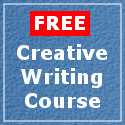 Hello everyone, welcome to the first session of our free online creative writing course. Over the next eight sessions we will be looking at different aspects of creative writing and trying our hand at various forms. I’d strongly encourage you to have a go at the exercises along the way, and please feel free to leave comments or ask questions at the end. If you have arrived on this page without first reading the home page and frequently asked questions page (on tab above) please go back and do so now. If you have read them, enjoy the course!
Hello everyone, welcome to the first session of our free online creative writing course. Over the next eight sessions we will be looking at different aspects of creative writing and trying our hand at various forms. I’d strongly encourage you to have a go at the exercises along the way, and please feel free to leave comments or ask questions at the end. If you have arrived on this page without first reading the home page and frequently asked questions page (on tab above) please go back and do so now. If you have read them, enjoy the course!
Creativity and Art
What is creativity? The Collins dictionary defines it as ‘the ability to cause something to exist’. Without getting into too much of an existential discussion, I would say that with every thought that is expressed, something has been created. It was Descartes who said: ‘I think, therefore I am’; well I would add, ‘I think, therefore I create’ (do you feel a God complex coming on?). But how do we express our thoughts? Sometimes we do it verbally, other times by body language and still again through what is loosely termed ‘art’.
Art takes place when a thought is expressed and fixed in a way that other people may experience it on an aesthetic level – through music, writing, painting, sculpture, choreography and so on. Many artists say that their best work takes place when they ‘by-pass’ the thought and simply express the feeling. This may be true, but for writers, who use a verbal medium, a feeling must first be converted into a thought before it can be put into words. Don’t over analyse the thought before you express it, as this way you can ‘channel’ the purest interpretation of the feeling, but some cognitive process needs to take place. Some writers prefer to mull over a thought and give it form before they put pen to paper – I’m one of them – but it’s good practice to try and switch off the ‘editor’ at least for the first draft. First response trigger exercises are useful in this regard and can release some unexpected words and images.
Exercise 1:
Write down your first response to these words or phrases:
- Blue ball
- And that’s when the sadness came
- Coffee
The first task of a good writer is to convert feelings into thoughts and then into words. This is the raw material that can then be converted into something more permanent. Some writers refuse to toy with their first drafts, believing their creativity will be diluted; I disagree. Allowing your critical mind to improve a piece of writing is where the craftsman meets the artist. Something produced only by the former will lack soul and something by the latter will lack form. Good writing is a combination of art and craft.
For public consumption
Art, of course, is highly subjective and one woman’s masterpiece is another woman’s unmade bed. We all have the ability to create, but whether or not our creation is ‘art’ must be left to the eye or ear of the beholder.
In this session we will look at how you can craft those creative thoughts into creative writing to share with other people. And that’s what sets ‘public’ writing apart from ‘private’ scribblings – there’s a perceived readership in mind. When I ramble on in my journal, I am the only one who will read it (hopefully!) so my only concern is getting my thoughts down on paper. The moment I want someone else to read it I begin to consider ways to improve the presentation and craft it into something more aesthetically pleasing. I consider which words may sound more colourful, whether or not my sentence structure is grammatically correct, whether I’m using evocative imagery, and so on.
Story, feeling or image?
What is it about those creative thoughts that you think might be of interest to other people? Do they speak of an eternal truth or a common experience? Do they make you laugh or cry? Do they suggest a story that will entertain or a poem that captures a moment that must be shared?
Exercise 2: In 50 words or less write down why you want to write then list three creative thoughts that you’ve had lately (each 10 words or less). These may be an image, a musing, a ‘truth’, a story, or so on. If you haven’t had any, take yourself for a walk and look around; what grabs your imagination? Browse through a newspaper or a magazine; do any stories or pictures catch your attention? Think back over your day; did anything funny, charming, shocking or unusual happen to you or someone you know?
Poetry or prose?
Some people are more suited to writing poetry than prose and some people do well at both. Although we won’t be discussing it in this course, other people are more suited to script. I’m one of them. I’ve had relative success as a prose writer and in fact have managed to earn a living from it, but it’s taken years of hard work to get to this point. I recently branched out into scriptwriting and found that I had much more of a natural ability. (If you’re interested in finding out more about scriptwriting, check out getting started in playwrighting). You may find that you’ve been trying to make it as a poet when actually you’re more suited to prose. Now I don’t want to pigeonhole anyone, but ask yourself the following questions:
- Are you more attracted to films than stills?
- Do you enjoy telling people ‘stories’ from your life?
- Do you prefer to read stories or poems?
If yes, to these, then you may be more suited to prose than poetry. If no, then the opposite may be true. If it’s ‘sometimes yes, sometimes no’ then perhaps you are suited to both. We shall be looking at how to write poems in more detail in session 7, but suffice to say, a poem is like a snapshot of a moment. If you can’t rest until you know what happened before and after, then prose may be your genre.
Exercise 3: Take one of the three creative thoughts you wrote down in Exercise 2, then list 20 separate words that communicate or describe that thought. Do not, at this stage, link the words into sentences. Once you have your 20 words use them in a poem of 16 lines or less. Then, take the same 20 words and work them into a short story of under 300 words. Which exercise came more easily? Which form has best communicated your creative thought?
Further Resources:
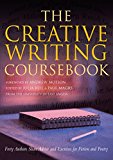
There are some excellent resources out there for creative writers. To get quick ‘starter’ images when your own well is dry I recommend The Writer’s Block by Jason Rekulak. I’m currently working through The Creative Writing Coursebook by Julia Bell and Paul Magrs and finding it very useful.
The next creative writing course session is how to write a short story. But before you move on to that, please feel free to leave a comment or ask a question in the box below.
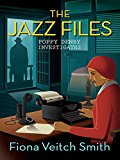
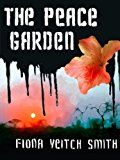
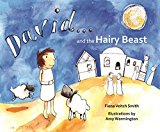
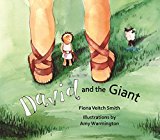
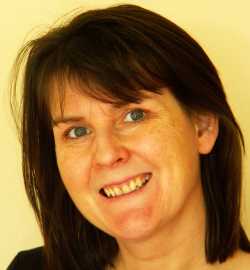 Welcome to The Crafty Writer's free online creative writing course, presented by Fiona Veitch Smith, a freelance journalist, editor, author, playwright, screenwriter and writing teacher. I hope that you'll see a dramatic improvement in the quality of your writing as you work through this course.
Welcome to The Crafty Writer's free online creative writing course, presented by Fiona Veitch Smith, a freelance journalist, editor, author, playwright, screenwriter and writing teacher. I hope that you'll see a dramatic improvement in the quality of your writing as you work through this course.
Hello Fiona,
Thank you for offering this course. I have always liked writing and actually had a short story and a couple of poems published long ago. However, life happens, and I haven’t pursued writing for the last several years. I recently retired and hope to do much more writing. I am looking forward to finding if I still have any ability. Again, thanks.
Tony Salvucci
Boston, MA
USA
To quote GM Hopkins: ‘Life is too much with us.’ But at least you now have some good material to write about! Hope you find the time and the opportunity.
All the best,
Fiona
Hi Fiona,
It had been a delight to read this article of yours and I enjoyed doing the exercises you had popped in. Keep doing such good work. I am starting with the next one.
Thanks!
Pooja
I enjoyed your little exercises, it got my creative side working
I ENJOY WRITING AND I AM ONLY DOING IT AS A HOBBIE
Hi,
I have recently come across your website and found it very helpful.
Edward.
hello,
I thought I can write just like that.But I feel it is very organised.I feel exicited.
I recently subitted a childrens book to a publisher and they advised me if a was serious about writing to take a writing course. I was thrilled when a fell on your site as I don’t have any money. I was a bit dubious at first as I have never been able to follow structure courses or teaching methods but I found the excercises very easy and enjoyable. I have always found poetry difficult to write but after following excercise 3 I discovered how easily the words just fell into place. I can’t wait to complete the rest of the course. Thanks for a great site. x
That’s great Elle! It’s people like you that I was hoping to help. And you’re proof that you don’t have to go down the paid critique route to still get something out of the course. The exercises were originally designed to help writers self-critique. I say this because I’ve just had a complaint that the course says it’s free but really isn’t. If you’re interested in writing for children I have some free articles over on the home site http://www.thecraftywriter.com/category/writing-for-children/page/2/ based on courses I’ve run.
Enjoy the rest of the course,
Fiona
I am currently on maternity leave and looking for something to do just to have some me time. I love Reading so thought of creative writing. When I read this I knew it was for me. I have already done first couple of e exercises & excited about exercise 3. Going to get that brain into gear.
Hi Angela, having a baby really revolutionised my writing. Before that I was the type of writer who felt that I had to feel inspired or be in the right mood or have the perfect room, pen, book, computer etc. It was pathetic! With a baby I was just grateful for any five minutes I had. And if I didn’t snatch that time and use it, it would be gone. Now I can write anywhere, anytime. I hope you are enriched through your ‘me time’!
Happy writing,
Fiona
Hi Fiona, great site you have here. I came across it while looking for online courses and I must confess, I didn’t take the exercises initially. But I felt such a rush with exercises 2 and 3 that i feel like rewarding myself! Thank you for putting together such a good website with exercises to match. I am considering career change and writing is my first consideration. I will look forward to other lessons. Thanks.
Tt
Glad you’re finding it useful. Happy writing!
Hi there, I’m glad that I came across your site. I’ve only found a few out of the dozens I’ve checked out that actually “speak” to me. Those are the ones that I follow and enjoy – they offer real opportunity to learn, discover and grow as a writer.
Being visually disabled, it’s uncertain how long I’ll have the sight I have. To me writing has always been my first love, plus it’s something that I can do even if I can’t see. (Thank goodness for technology. It’s been my window to the world and my bridge to communicate with others.
I hope that someday soon I will have something polished and inspiring for others to enjoy. Being in love with the creative muse, being a word weaver as my kids have dubbed me and passionate about my art helps to make me feel that this is my purpose. This is what I’m meant to do and I want to do it well.
Thanks for offering your insight, knowledge and heart to help others refine their own “voice”.
Thank you Starr, that is a very kind and thoughtful thing to say. I do pray that your word-weaving will not slip away with your sight. Long live the written and spoken word!
Fiona
I really love this site. Its good and free enough. Anyway,im a terrible,terrible poet,and i just realised i have made an unconscious decision never to write poetry,so the thought of writing that poem in Exercise 3, just gives me a writers block. Is it going 2 affect my learning in any way,if i ignore d poem section of the course and just concentrate on the prose. Tnx so much 4 this course btw,i love it.
You don’t have to do the poem if you don’t want to! Don’t let that stop you from doing the course. Just skip that bit if you want to. The course is predominantly prose anyway.
Happy writing
Fiona
Have been trying to write (unsuccessfully) for years, but never really completed anything i’d started. The whole experience was like an aimless ramble in a wilderness where i was getting hopelessly lost. I hope this course will help me find my destination.
I have never really felt confident about any of the prose I write. I hope that venturing in this course would allow me the possibility of finally writing with a sense of satisfaction. I have already worked on the initial exercises of this course and I’m more than trustful that finishing the rest would let me be fully what I have always wanted to be. Thanx for having this free course available!
Here’s to you finding satisfaction, Wiseblood!.
Ms., I am from Braziland I will try to make the course. I can read English, but not so well.
I am sure it will be a powerfull exercise…
Thank you for keep it free.
Luciliam
I hope the course helps you, Luciliam. Good luck.
hi im from south africa…i have been trying for a while to write…it’s like a need in me to put my thoughts to paper..but i do not know if it is any good. my friends read a short story of mine and says i have to send it to magazines…but i dont know how or if they will like it…i would dearly love to write a novel…can u help me?
Hi Antoinette,
I suggest that you work through the course as it will give you the basics of all creative writing – short stories and novels. We don’t actually look at novel structure in the course, but that’s something you can work on afterwards. Good luck with it. I just got back from SA last night!
All the best
Fiona
I am so excited about this course thanks so much.
You’re wellcome Virginia. Happy writing!
This is really helpful i enjoy writing and the exersices will stretch me enough to build myself as a writer
Enjoy the stretch!
I like this. It helped me a lot with my writing. It made me feel comfortable with my own writing and how I write. Thank you for this, I hope to teach a creative writing class someday. I am very devoted for my age, which is 14. Again, thanks for the helpful exercises!
Glad to be of service, Courtney. And good luck with your writing!
Thank you. This small breakdown has really helped me understand the writing process. There is a writer in me dying to get out! I arrived in the UK at the tender age of 9 not speaking a word of English. Having read the lion, the witch and the wardrobe aged 10 I have been hooked and fascinated by books ever since.
Hi Ligia,
Well CS Lewis is a wonderful intro to the English language! I hope that writer gets out soon
Fiona
As many have said before, thank you for this course! I have written several stories, or have attempted anyway, and always ended up loosing interest when life and work got in the way. Poetry mostly comes easy to me, but I’ve never tried to make one up around set words before. I aspire to write stories, and feel your course will definitely steer me towards that end!
I do hope it will help you John.